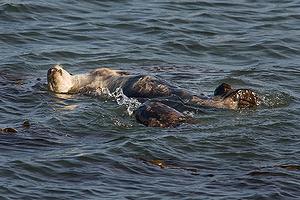 美國布希政府11日大刀闊斧修改《瀕危物種法》(Endangered Species Act),授權聯邦政府機構不需與專家協商,即可自行評估決定各項建設和活動是否會對瀕危與受威脅物種造成傷害。內政部官員辯稱這項提案將更易於法令執行,但批評者認為這反而會摧殘那些保護受瀕危動植物的法令。
美國布希政府11日大刀闊斧修改《瀕危物種法》(Endangered Species Act),授權聯邦政府機構不需與專家協商,即可自行評估決定各項建設和活動是否會對瀕危與受威脅物種造成傷害。內政部官員辯稱這項提案將更易於法令執行,但批評者認為這反而會摧殘那些保護受瀕危動植物的法令。
美國內政部表示,此項提案中的改變,將鬆綁現今聯邦政府機構必須諮詢聯邦野生物專家的規定。這些諮詢要求原本是為了確保伐木、採礦與道路建設等各項活動不會有害瀕危物種。
但是內政部認為每年根本不需要上千個這類的協商。美國內政部長坎培松(Dirk Kempthorne)表示,現行的規定造成了不必要的衝突和延誤。
根據這項內政部的修法議案,聯邦政府機構如果認為他們的行動對瀕危物種只會造成些許傷害,就可以跳過諮詢程序;但是,這樣它們也必須為往後瀕危物種的任何傷害負責。
此修法議案也限定,聯邦野生物機構必須在60天內回覆諮詢案件,如果提出的生態衝擊分析報告超出此時效,開發機構可不必加以理會,計劃仍可繼續推行下去。
坎培松表示:「這次修法後,法令還是能繼續保護瀕危物種。只是,我們著眼在諮詢程序──這項程序攸關聯邦計畫與其後續風險、以及對瀕危物種衝擊的評估。我們真正需要的是,更快速的諮詢程序,以更有效率地使用我們的資源。」
美國漁業暨野生動物局局長霍爾(Dale Hall)也稱此提案是「正確邁前的一大步」,他表示現行的協商規定是二十幾年前訂的,但現在聯邦政府團隊內已經有比當時還多的專家,可以評估政府的行動是否會危害瀕危物種。
然而環保人士與民主黨議員們並不買單。美國國家野生生物基金會資深人員科斯迪亞克(John Kostyack)表示:「這次法規改變恐使布希政府摧毀三十幾年來的環境進展。他們不但排除中立專業的野生生物學家,還縱容特定的政客壟斷決策大權。」
The Bush administration has proposed sweeping changes to the Endangered Species Act, releasing a plan to give federal agencies the authority to decide without expert consultation whether their activities could harm endangered and threatened species. Administration officials contend the proposal will make the law easier to implement, but critics say the plan would undermine federal protection of imperiled plants and animals.
Announced Monday by the head of the U.S. Interior Department, the proposed changes would relax the current requirement that federal agencies consult with federal wildlife experts to ensure activities they undertake or approve - such as logging, mining and road construction - do not adversely affect listed species.
Thousands of such consultations occur each year, but the administration argues they are not worth the hassle."The existing regulations create unnecessary conflicts and delays," said U.S. Interior Secretary Dirk Kempthorne.
Under the proposed revisions, federal agencies would be permitted to bypass the consultation process if they believe the action in question would cause little harm to listed species. If an agency chooses to skip consultation, it would be responsible for any subsequent harm caused to the species in question.
The plan also imposes new deadlines on federal wildlife agencies to respond to a request for consultation, requiring a response within 60 days. If they fail to respond within that timeframe, the project in question may proceed without their analysis.
"The proposed regulations will continue to protect species while focusing the consultation process on those federal actions where potential impacts can be linked to the action and the risks are reasonably certain to occur," Kempthorne said. "The result should be a process that is less time-consuming and a more effective use of our resources."
Dale Hall, director of the Fish and Wildlife Service, called the proposal a "positive step forward."The existing consultation requirements were developed more than 20 years ago, he said, and federal agencies now have far more expertise to determine whether their activities imperil listed species.
Environmentalists and congressional Democrats are far from convinced."With these changes, the Bush administration threatens to undo more than 30 years of progress," said John Kostyack, a senior official with the National Wildlife Federation.
"These changes take unbiased, professional wildlife biologists out of the equation and put decisions in the hands of political appointees," he said.
全文及圖片詳見:ENS






